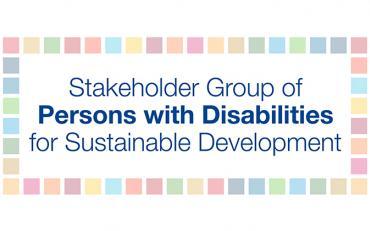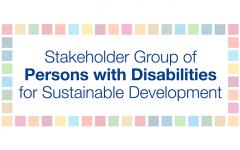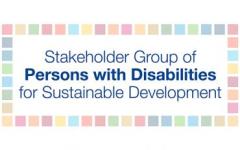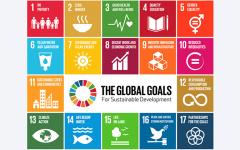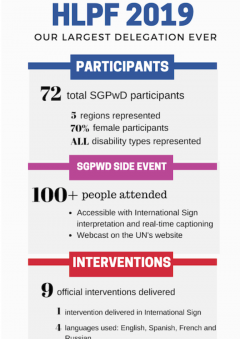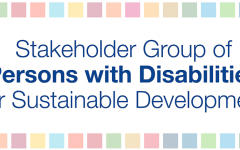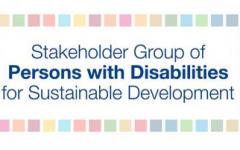January 2018
<< Back to HLPF 2018 main page
Download Word version of this bulletin
General information
The 2018 High-level Political Forum (HLPF) will be held from Monday, 9 July, to Wednesday, 18 July 2018 in New York. The theme is "Transformation towards sustainable and resilient societies." The set of Goals to be reviewed in depth will be: Goals 6, 7, 11, 12, 15 and 17.
In 2018, there will be 48 countries that will report on their progress achieved on implementing the SDGs. These countries include: Albania, Andorra, Armenia, Australia, Bahamas, Bahrain, Benin, Bhutan, Cabo Verde, Canada, Colombia, Dominican Republic, Ecuador, Egypt, Greece, Guinea, Hungary, Iceland, Ireland, Jamaica, Kiribati, Lao People’s Democratic Republic, Latvia, Lebanon, Lithuania, Mali, Malta, Mexico, Namibia, Niger, Paraguay, Poland, Qatar, Republic of the Congo, Romania, Saudi Arabia, Senegal, Singapore, Slovakia, Spain, Sri Lanka, State of Palestine, Sudan, Switzerland, Togo, United Arab Emirates, Uruguay and Vietnam.
In this edition:
I. Global processes
- Parallel events to the 2018 HLPF
- Official Submission of the Stakeholder Group of Persons with Disabilities
- Expert Group Meeting on Interlinkages
- World Urban Forum 9
- Financing for Development Forum
- OECD DAC Marker on Disability
- Stakeholder Group of Persons with Disabilities: List of SDG indicators to be disaggregated by disability
- The 2019 Global Sustainable Development Report (GSDR)
- Voluntary National Review (VNR) webinar in February
- UN Development System Review Process Stakeholder Consultation Summary Report
- Briefing of the Multi-Stakeholder Forum on Science, Technology and Innovation for the Sustainable Development Goals (STI Forum)
- Upcoming events
New! In order to facilitate communication we have created a new e-mail address: hlpf2018 [at] ida-secretariat.org (). If you have information to share or would like to get in touch with us, please use the email hlpf2018 [at] ida-secretariat.org
I. GLOBAL PROCESSES
1. New! The following parallel events are scheduled during 2018 HLPF
July 11th - Higher education institutions and universities
July 13th - Partnership exchange
July 16th - Local/regional authorities’ forum
July 17th - Business forum
Dates are confirmed, further information will be forthcoming.
2. Official Submission of the Stakeholder Group of Persons with Disabilities
The Stakeholder Group of Persons with Disabilities has the right to make an official submission to the UN’s High-level Political Forum. The document will be part of the official meeting and published on the UN website and also widely disseminated to the Member States and the UN system.
The title of 2018 submission is “Sustainable and resilient societies and the inclusion and leadership of persons with disabilities.”
The Goals under review that will be elaborated on in this submission include:
- Goal 6: Ensure availability and sustainable management of water and sanitation for all;
- Goal 7: Ensure access to affordable, reliable, sustainable and modern energy for all;
- Goal 11: Make cities and human settlements inclusive, safe, resilient and sustainable;
- Goal 12: Ensure sustainable consumption and production patterns;
- Goal 15: Protect, restore and promote sustainable use of terrestrial ecosystems, sustainably manage forests, combat desertification, and halt and reverse land degradation and halt biodiversity loss.
[ACTION!] We are inviting you to share any information/research/material work on the theme and Goals by 15 February 2018. Please send any information to hlpf2018 [at] ida-secretariat.org.
The objective is to produce a six-page document by 2 April 2018. Currently, this is a call for inputs, then we will review all materials received and from this, we will compose an outline. We will post the outline and subsequent drafts on the CRPD listserv for consultation.
3. Expert Group Meeting on Interlinkages
[INFORMATION!] The Expert Group Meeting (EGM) entitled "Advancing the 2030 Agenda: Interlinkages and Common Themes at the HLPF 2018" was organized by UN-DESA in New York on 25-26 January. The Stakeholder Group of Persons with Disabilities was represented by Jose Maria Viera, World Blind Union (c.f. below picture).
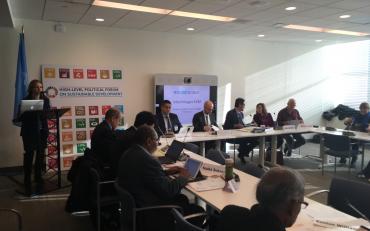 The following key messages were delivered on behalf of the Stakeholder Group of Persons with Disabilities:
The following key messages were delivered on behalf of the Stakeholder Group of Persons with Disabilities:
- Urgent call to UN member states and UN system to collect data desegregated by disability using as a baseline the Washington Group short set of questions;
- Urgent call to raise awareness of producers working on SDGs to make their models accessible. For instance, distinguished researchers and scholars presented different models to measure SDGs implementation however those were not accessible. Or, for example, the data collected was not fully accessible to persons with disabilities.
- The need to include disability as a crosscutting issue. There was almost no reference to persons with disabilities during the different sessions of the meeting.
- Special call to include persons with disabilities in DRR and humanitarian emergences programs.
- The need to incorporate a human rights perspective in the SDGs framework. The interlinkages between SDGs and UNCRPD.
- The need to promote Civil society consultation when implementing the SDGs.
- The need to connect the global and the national level when implementing and monitoring the SDGs.
- The need to consider cities and human settlements inclusive, safe and resilient. Cities and human settlements must be seen as environments / systems were other rights such as health, education, cultural life, sport etc. can be enjoyed by all.
In less than three weeks, approximately 15 delegates from our Global Network for Disability Inclusive and Accessible Urban Development (DIAUD) and the GAP Partner Constituent Group for Persons with Disabilities will work to influence the outcome of World Urban Forum (WUF) 9 in Kuala Lumpur. They will be shaping the discourse regarding access, equity, and inclusion and how these concepts can be implemented under the framework of the CRPD, New Urban Agenda, and the Sustainable Development Goals.
The delegates are focused on providing practical solutions for advancing the rights of people with disabilities and shaping a more inclusive urban future for all. Representatives will be advocating for clear commitments to ISO accessibility standards, and the adoption of universal design principles as specified in Article 8 of the CRPD. In light of these efforts, we want to collect information on the participation of key delegates committed to disability rights that may be attending the World Urban Forum. We want to gather a list of advocates, allies, or leaders committed to disability inclusive urban development. We intend to nominate them speakers to key panels and help coordinate advocacy and media activities during the forum. We now have 7 events, and 4 other partnered speaking opportunities for our delegation. Kindly find flyers and description attached to this email.
We are trying to help coordinate a strong participation and we want to keep everybody informed of key developments. One main development is the coordination of the Persons with Disabilities Roundtable we are helping develop with UN-Habitat. That is why we want to develop a comprehensive list of registered delegates/participants so as to maximize our advocacy efforts during the event.
If you do know of key people attending the WUF, please respond in line to the following questions:
- Will you or your organization attend or send a representative to the World Urban Forum in Kuala Lumpur (February 7-13), if so could you please provide their name and contact information?
- Do you know of a key leader, ally or advocate in urban development or accessibility that is attending WUF9 - can you provide us his/her name, organization, contact information?
- If you are attending, please provide us the dates you arriving and departing from the Forum?
Please share this link with any colleagues going and suggest they join the WUF9 - PWD WhatsApp Group
Please make all the efforts to respond our inquiry immediately. Kindly reply to: victor.pineda [at] gaates.org and luis.artieda [at] worldenabled.org
5. Financing for Development Forum
The Financing for Development Forum has an updated page here: http://www.internationaldisabilityalliance.org/ffd-forum
Polly Meeks and Dr. Elizabeth Lockwood from CBM are focal points in this process. For additional information please contact Elizabeth and Polly here: Elizabeth Lockwood elizabeth.lockwood [at] cbm.org and Polly Meeks polly.meeks [at] googlemail.com
6. OECD DAC Marker on Disability
[INFORMATION!] There is currently a proposal to introduce a marker on disability in to the OECD DAC’s reporting system. The OECD’s database on official development assistance (ODA) – the Creditor Reporting System (CRS) – includes ‘markers’ that flag aid flows for particular policy objectives such as gender equality. The system doesn’t currently include a marker for disability equality, and so there is currently no data on how much aid goes to disability inclusive projects. Data on the amount of aid spent on disability inclusion is critical to assessing whether donors are meeting their commitment to disability inclusive development – as well as for advocacy around increasing the amount spent. The proposal for the marker is currently in draft it will be discussed at a OECD DAC statistics meeting at the end of January, with written comments made by the end of February. As long as there is no significant objection from DAC members, the marker will hopefully be approved at the end of June.
There are two ways you can currently support the development of the marker:
1) if you are in contact with a government who is a member of the DAC, talk to them about the marker and ensure that they are supportive of it
2) IDDC and IDA are currently putting together comments on the draft and would welcome input.
If you would like more information about getting support for the marker or if you would like to make any comments on the draft, please get in touch with Hannah Loryman (hloryman [at] sightsavers.org). Please send comments by 14 February 2018.}
We are calling on States to carry out their responsibility to collect and disaggregate data in line with the 2030 Agenda for Sustainable Development and the UN Convention on the Rights of Persons with Disabilities (CRPD)[1]. States must ensure that their national policies for persons with disabilities are informed by evidence-based data that realize the political commitments of the 2030 Agenda and legally-binding obligations outlined in the CRPD. To create effective and meaningful policies that guarantee the rights of persons with disabilities it is critical to disaggregate the SDG indicators by disability. The Stakeholder Group of Persons with Disabilities undertook a broad consultation process to choose which of the 232 global SDG indicators should be disaggregated by disability. There was a clear understanding among all contributors that all relevant SDG indicators should be disaggregated by disability, particularly all the indicators in Goals 1, 3, 4, 5, 11, and 16. The findings found 31 critically important indicators that must be disaggregated by disability, 11 of which already have disability references (below in red). The indicators are listed as follows with the full table below.
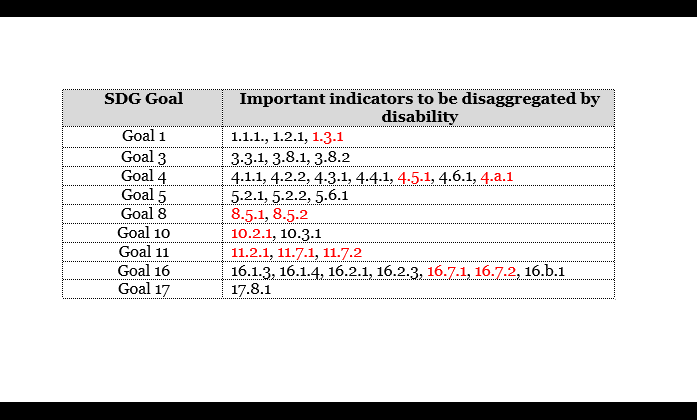
[1]The 2030 Agenda for Sustainable Development: paragraph 48, paragraph 57, and Goal 17.18; CRPD Article 31; and GA resolution A/RES/71/313
Click here to view the Global Indicator Framework in the six official UN languages.
8. The 2019 Global Sustainable Development Report (GSDR)
[INFORMATION!] The Stakeholder Group of Persons with Disabilities contributed to the GSDR by using official submissions to the 2016 and 2017 HLPFs and previous thematic documents. We contributed into the four major areas: (1) interactions among SDGs and their targets, (2) transformation pathways towards sustainable development; (3) looking beyond the SDGs (major issues identified by research which are not explicitly taken into account in the SDGs), and (4) the role of science for sustainable development. Contributions will be acknowledged in the GSDR.
Background:
The GSDR, mandated by the UN Member States in the outcome document of the 2012 Rio + 20 conference, is meant to strengthen the science-policy interface and provide a strong evidence-based instrument to support policymakers in promoting poverty eradication and sustainable development. The GSDR is being drafted by an independent group of scientists (IGS), supported by a task team of six UN-system agencies.
9. Voluntary National Review (VNR) webinar in February
[Save the Date!] The Stakeholder Group of Persons with Disabilities will hold its first open platform to discuss participation in the VNRs. During the webinar, guest presenters will introduce how to engage in the VNRs at the national level provide examples from Ireland, Senegal and Switzerland, which are undergoing reviews in 2018. We will also have presentations from experiences of reviews in 2017. We encourage everyone to join the webinar and engage in an interactive dialogue. The webinar will be accessible with International Sign and captioning.
The webinar will take place on Wednesday, February 21 from 9:00 to 10:00 EST.
After registering, you will receive a confirmation email containing information about joining the webinar.
Please click here for captioning.
10. UN Development System Review Process Stakeholder Consultation Summary Report
[INFORMATION!] At the request of the Executive Office of the Secretary-General, UN-NGLS facilitated a civil society consultation from October to December 2017 to discuss the ongoing review of the UN development system, open to representatives of non-governmental organizations, civil society organizations, philanthropy, academia, and social entrepreneurs. This was the official channel for these stakeholders to provide analysis of the findings of the Secretary-General’s June 2017 report and submit proposals to inform the ongoing process of repositioning of the UN development system, particularly related to activity at the country level, ahead of the Secretary-General’s second report.
This consultation was conducted in line with General Assembly resolution 71/243 on the Quadrennial Comprehensive Policy Review, and following the submission of the first report of the Secretary-General on the repositioning of the UN development system to support the delivery of the 2030 Agenda. The Secretary-General's report was informed by continual engagement with Member States, the UN system and other stakeholders.
The stakeholder consultation summary report includes the following reference to persons with disabilities: "A UN system-wide task force should be formed to provide policy guidance, including at the country level, toward efforts to enhance the implementation and integration of the Convention on the Rights of Persons with Disabilities as a key for achieving the SDGs for persons with disabilities." [Please keep in mind this is a civil society recommendation which has not been included in the Secretary General report].
The full stakeholder consultation summary report can be found here.
The Secretary-General's December report, "Repositioning the UN development system to deliver on the 2030 Agenda: our promise for dignity, prosperity and peace on a healthy planet" is available here.
[INFORMATION!] On 28 January, the President of the UN General Assembly held a briefing on the Third STI Forum, which will be held on 5-6 June, 2018 at the UN Headquarters. The Co-Chairs of the Forum are Mr. Toshiya Hoshino (Japan) and Mr. Juan Sandoval Mendiolea (Mexico) emphasized the multi-stakeholder approach of the Forum. The program and agenda for the 2018 session are not yet defined, as the co-chairs are seeking elements for discussions. During the meeting a number of such elements have been raised: funds for technology, gender as cross-cutting issue, participation for all, the situation of the African continent, the role of technology on the job market, gaps between States in development and technology, and access to financing.
As background, the STI Forum provides a venue for facilitating interaction, matchmaking and the establishment of networks between relevant stakeholders and multi-stakeholder partnerships in order to identify and examine technology needs and gaps, including with regard to scientific cooperation, innovation and capacity-building, and also in order to help facilitate development, transfer and dissemination of relevant technologies for the Sustainable Development Goals. It discusses science, technology and innovation cooperation around thematic areas for the implementation of the Sustainable Development Goals, congregating all relevant stakeholders to actively contribute in their area of expertise.
Additional information:
- Click here to read more information available on the 2018 STI Forum’s Website.
- Click here to read more information about the 2017 STI session and the participation of the Stakeholder Group of Persons with Disabilities available on IDA’s website.
- February 14-16th – the UN and World Bank are organizing the First Global Conference of the Platform for Collaboration on Tax – Taxation and the Sustainable Development Goals. For additional information please click here.
- NEW! FromMarch onward – in addition to the monthly Bulletin we will hold monthly webinars to provide up-dates and opportunity for discussions in preparations to HLPF2018.
- April 9-12th– Seventh meeting of the IAEG-SDGs in Vienna, Austria.
- May 23rd – ECOSOC Special Meeting: “Towards sustainable, resilient and inclusive societies through participation of all” at the UN in New York.
- June 11th – Financing the implementation of the SDGs organized by the President of the UN General Assembly at the UN in New York.
Regional Engagement
Every bulletin will focus on regional engagement of DPOs. It is a space to exchange on our advocacy in the five regions (Asia Pacific, Europe, Latin America, the Arab region and Africa) and to make the link between the national and global levels. It is also an opportunity to update each other on the regional work done around the yearly forums hosted in each region to prepare Member States to the High-level Political Forum.
Please share information on what is taking place for persons with disabilities and the SDGs in your region. Dr Marion Steff from the European Disability Forum will manage the content; please send information to marion.steff [at] edf-feph.org marion.steff [at] edf-feph.org (). We will share the information in the next bulletins. Content needs to be sent each month before the 10th of that month.
For more information on what is taking place at the Regional UN Headquarters, click on the following links:
- ECLAC (UN Economic Commission for Latin America and the Caribbean): https://www.cepal.org/?idioma=IN
18-20 April, Santiago
- [REGISTRATION OPEN!] ESCAP (UN Economic and Social Commission for Asia and the Pacific): http://www.unescap.org
28-30 March, Bangkok
See details below.
- [REGISTRATION OPEN!] ECE (UN Economic Commission for Europe): http://www.unece.org/info/ece-homepage.html
1-2 March, Geneva
Click here to register by 16 February. Please register for the main meeting and the two round tables of your choice. Additional information can be found here.
- ESCWA (UN Economic and Social Commission for Western Asia): https://www.unescwa.org
24-26 April, TBC
- ECA (UN Economic Commission for Africa): https://www.uneca.org
TBC
ASIA
Asia Pacific Forum on Sustainable Development (APFSD), Bangkok, 28-30 March 2018
The APFSD is organized by APRCEM with UNESCAP. The event will be on the HLPF 2018 theme “Transformation towards sustainable and resilient societies”.
Draft agenda:
- Regional perspectives on the follow-up to and review of the 2030 Agenda for Sustainable Development.
- Regional Trend + Presentation of ESCAP Report (panel)
- Means of Implementation (panel)
- Roundtables – goal 6, 7, 11, 12, 15
- Panel on Roundtables – report back and coherence
- Strengthening the Implementation of Agenda 2030
- VNR Report – Laos, Sri Lanka, Vietnam, Kiribati, Singapore and Togo (there will be country presentation)
- Implementation of Regional Roadmap
- Partnerships
- Adoption of APFSD report and Chair’s Summary
- SIDE EVENTS: will be very limited due to limited time. There will be Pavilion of Partnerships (exhibition). Application for side events, please contact APRCEM and UNESCAP.
CSO Forum (now called Peoples’ Forum), 25-27 March 2018
We are planning to have a bigger and more vibrant forum this year for our preparatory meeting to APFSD 2018 which will be organised by APRCEM, APWLD, UNESCAP and UN Environment. The current plan is to do it in Chulalangkorn University or Student Christian Center near Chula University, Bangkok that can accommodate 250-300 people.
If we manage to secure bigger venues, Instead of series of panels and breakout groups, this year we might open opportunity for participants to apply for self-organised workshops, mainly around the theme of: (1) systemic barriers to achieve sustainable and resilient societies, (2) theme around 6 cluster goals and the intersection to other goals, (3) theme around accountability and monitoring – i.e role of APFSD, HLPF, sub-regional processes, development justice indicators, and (4) theme around the Power of Peoples’ Movements – to showcase movements different concepts, framework, innovation, approaches, strategies to struggle for sustainable and development justice. However, all proposals may not be accepted due to limited time and space. In addition, this may not necessarily entitle the organization to guaranteed seats as participants. (Please do not suggest side events until the call is issued). However, depending on capacity, some seats may be reserved during the AP CSO Forum for key resource persons and side event organisers.
We are opening call for volunteers who want to be in tasking committee, kindly note that it doesn’t automatically guarantee your selection as participants. Please see below the available tasking:
- Logistical Committee: prepare the venue and the needs of the Peoples’ Forum, making ocular visit, registration, arrange accommodation, travel, follow up with invitation / visa, budgeting.
- Exhibition Committee: for both Peoples’ Forum + APFSD, make guidelines for the exhibitions, call for application for exhibitions, arrange different venues.
- Programme Committee: prepare the concept note + programme for CSO Forum, guidelines for workshops, guidelines for speakers, contacting the speakers.
- Drafting Committee: prepare key messages and methods to verify key messages, prepare surveys.
- Advocacy Committee: develop strategy for APFSD, ensure meaningful engagement at the APFSD and provide political direction based on APRCEM collective position.
- Communication Team: media strategy and social media.
Click here to sign up. Deadline is 31 January 2018.
Register for the CSO Forum and the APFSD: A call for participation will be circulated by ESCAP starting TODAY, 29 January 2018 – 16 February 2018.
--------
